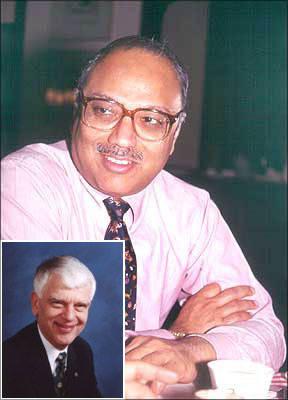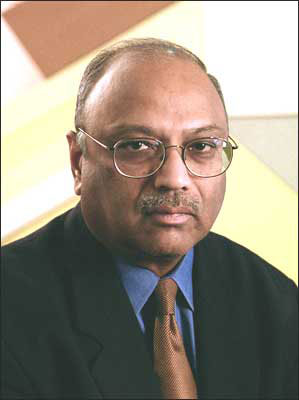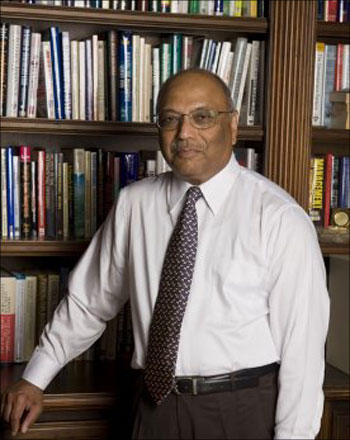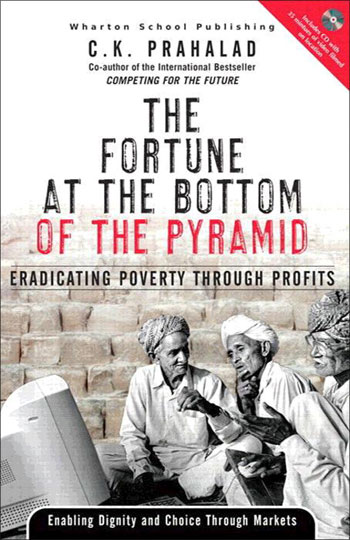
Dr Alan G Merten, President of George Mason University in Fairfax, Virginia, since 1996, was among the business faculty at the University of Michigan in the late 1970s that interviewed and hired C K Prahalad.
In 1983, Merten also went to bat for Prahalad when the latter's apparent non-traditional approaches to teaching and research and lack of publications at the time had threatened his receiving tenure. Many of the senior and entrenched faculty members had argued against recommending a permanent position for Prahalad who would later go on to be acclaimed as the world's foremost management guru.
In an exclusive interview with rediff.com, Merten -- who left the University of Michigan in 1986 to take over as Dean of the College of Business Administration at the University of Florida (1986 to 1989), and then Dean of the Johnson Graduate College of Management at Cornell University (1989 to 1996), before coming to George Mason University as President) -- reminisces about his long-time colleague and friend of more than three decades who families not only interacted with each other regularly, but also often vacationed together.
Both were also Visiting Fellows at Insead in Fontainebleau, France, known as the business school to the world.
When did you first meet CK Prahalad and what were your impressions of him at the time?
I met CK in 1977, when I was a professor teaching information systems at the University of Michigan Business School and we hired CK. He had finished his degree in 1977 and gone back to India and then come back to the US and we hired him in 1977.
But we became very close after 1983 when I was Associate Dean responsible for the executive programs and CK was one of our teachers not only in the MBA program but the executive program, and in the 1983-84 time framework, he was up for tenure and I sat on the executive committee and I was one of the young Turks in this committee and some of the more senior faculty weren't sure about this guy, because he wasn't a traditional business school faculty member. . .
. . .

In what way?
He wasn't writing for the most prestigious academic journals -- he was more applied. And, it was something I was always impressed with, but it wasn't a sure case (for tenure).
I can actually remember feeling the vibes in the room when we were talking about should he be given tenure. And, I remember saying, 'Yes', but there were others who weren't quite sure.
What impressed me from the beginning about CK, he was just an excellent teacher, and it didn't make any difference if he was teaching MBAs or CEOs. I wrote (a condolence letter) to Gayatri (Prahalad's wife) and I said that I used to enjoy watching him sparkle in front of a class, and that's the only word I could think to describe his teaching. He lit the place up.
He was solid in terms of facts but he constantly challenged the students. And, again, it could be a first year MBA or CEO, he'd walk up to them in the class and just stand over them and make them think. You couldn't hide in CK's classes.
Obviously, he was 'outside the box' in terms of the traditional business school professors?
What CK represented at that time was recognition that business schools in some areas of finance and accounting could be very theoretical, but when you talked about strategy and policy it was different.
You weren't writing for the Journal of Finance or for the Accounting Review, you were writing for the New York Times or you were writing for the Harvard Business Review. It wasn't the traditional academic article, but they had to be researched.
He gave business strategy an academic credibility. He said it's not the mathematics, but it is in a sense. . . it's important. . . there is such a thing as research in business strategy. I think before him, there had been more storytelling in business strategy.
. . .

Up to the time of his being up for tenure, he hadn't published much and that's why the senior faculty guys wanted to deny him tenure?
He hadn't really done much. The way I remember feeling about CK -- because I was running the executive programme -- there was something he was adding that was different than one more academic journal article, but as important and for many cases was becoming more important.
But in that 1980s framework, it wasn't a slam-dunk for everyone as to should he be part of the business school.
Ironically, how it all changed when he started writing but to think that this guy who attained almost iconic stature as the management guru of the times, could have been denied tenure at the school where he made his mark?
Yes, of course, because after that, then all of a sudden it became very clear when he started writing and he started research.
He used to get angry when his type of research was questioned. He would say it was just a different kind of research -- not mathematics, not just one more formula in a journal paper, but it's still research. That it was not just cases, but it's research. And, those of us, who were on his side, we all stuck together and then all of us pushed executive education at Michigan.
We said just as the MBA programme and the PhD programme were important to the business school, executive education was equally important. So, we were radicals and we were right.
Speak to how he was as a colleague and friend?
He was always fun to be around. You never knew what he was going to come out with. Sometimes he'd say something just to get your attention.
He always challenged. 'Have you thought of that Alan?' 'I hadn't CK.' 'Well, why not?' You had to know his style. It appeared confrontational but it really wasn't. He really wanted to know. He didn't ask you a question because he already knew the answer; he asked the question because he wanted to know, wanted to learn.
It was a case of constantly brainstorming with CK -- have you thought of this, have you thought of that. I said to Gayatri that I learned a lot from him that helped me as a business school dean for 10 years and as a president for 14. My children knew his children.
We were all actually together for quite a while at Insead in Fountainebleau, France. We were visiting scholars and that's when our families really grew close and our kids got to know each other.
. . .

And he was a loyal friend?
You bet he was! He was always a loyal friend. He also had this global instinct. He knew how to talk about the world -- not one part being better than the other. He made you think about the world even though you didn't want to sometimes.
And, as a speaker, he was a dynamo -- he sparkled, and that's the only word I could always think of when he spoke.
Did he bring his Indian upbringing, education and culture to the table -- his Indian-ness, if you will?
The Indian in him was the global in him. In a sense, because he was from India, you could see him as an Indian and then you could see him as an American. There was no clash. They were like two sides of the same coin. I rarely thought of him as an Indian or an American. He was CK and that's how it always was to me -- he was CK.
All the kudos and all of the tributes that have been showered on him as the quintessential management guru, was it all justified?
Absolutely. He brought science to the art of management and science to the art of management strategy. When he would talk, he always structured his ideas.
People in strategy, prior to CK, were good story-tellers, they could tell you what happened at such and such a company, but what CK would do is he may tell you what happened at three companies and then would challenge you as to what the message was -- what do we learn from all this.
He would walk up to the white board with pen in hand and sort of create ideas out of stories.
. . .

Would you say, he was of the calibre of giants that preceded him, like Peter Drucker?
Without a doubt! He was always moving ahead. The fundamentals were always there: a sort of science and art of management. . . the science and the art of leadership. . . but he applied that at different places.
He applied it in different countries, he applied it in different companies, and he applied it in sort of different economic times. It was the order out of chaos, is what I used to like about him.
So, his passing at age 68, you would say is a big loss because he probably had so much more to contribute?
What a loss, what a huge loss! But I said to Gayatri, he lives on in everyone he taught and he lives on in every article or book he wrote. So, he's gone and we all suffer from it, but there's CK in Alan Merten, there's CK in the students he taught, there's CK in anyone who came across him and interacted with him, whether you saw him in the hallway or you saw him in front of 10,000 people or read his articles of books.
He lives on in all of us and we are all so much the better and richer for it. It wasn't just the 'what' with CK, it was the 'how'. He stood up and said, 'I am going to make more order out of the process of management and leadership'. Everyone else could tell you stories about it, but CK could tell you what it was.